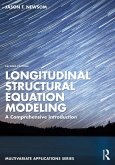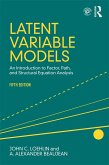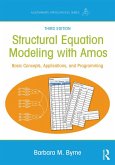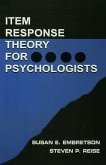Dieser Download kann aus rechtlichen Gründen nur mit Rechnungsadresse in A, B, BG, CY, CZ, D, DK, EW, E, FIN, F, GR, HR, H, IRL, I, LT, L, LR, M, NL, PL, P, R, S, SLO, SK ausgeliefert werden.
Hinweis: Dieser Artikel kann nur an eine deutsche Lieferadresse ausgeliefert werden.
"With this highly accessible, easy-to-follow, step-by-step guide for analyzing both simple and complex latent variable models in the increasingly popular R software program, Finch and French provide an extremely valuable service to researchers in various fields." - Christian Geiser, Utah State University, USA
"A major characteristic of this book is the user-friendly presentation of content and easy to follow examples. It provides excellent instruction to gain basic proficiency in the methods and reaches a large audience." - Karl Schweizer, Goethe University, Germany
"The book integrates technical details and examples in a way that is friendly to beginner users of structural equation modeling and item response theory, and helps readers assimilate the concepts and transfer to their own research needs." - Walter L. Leite, University of Florida, USA
"A cohesive and accessible resource for applying the R language to analyze data in a latent variable framework. ... I found what was written to be easy to understand. ... I would use it, recommend it to others, and likely adopt it as a supplemental text." - Natalie D. Eggum, Arizona State University, USA
"This book is truly unique. ...The writing style is clear and comprehensible. ... [It] will ... serve as a ... supplementary text in ... measurement, latent variable modeling, and IRT classes." - D. Betsy McCoach, University of Connecticut, USA
"This ... book covers all the latent variable models commonly used in social sciences. ... [It] can be used as a text ... for ... courses ... in ... structural equation modelling, psychological measurement, item response theory, and mixture model or latent class analysis. ... [It] makes a significant contribution to the field. ... I will use [it] as a supplement ... and recommend it to my colleagues who ... teach Psychological Measurement and Item Response Theory."- Ke-Hai Yuan, University of Notre Dame, USA
"The topic has the potential ... to be of broad interest in social, prevention, and public health sciences. ... [It] could be of great interest to ... my students in courses on latent variable modeling." - Patrick S. Malone, University of South Carolina, USA









